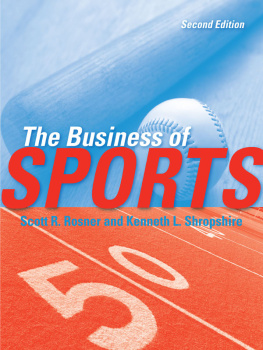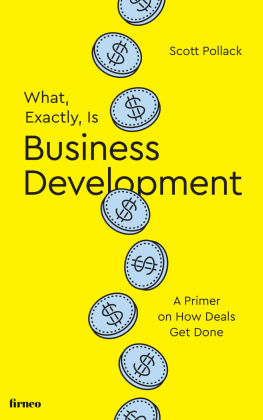Scott R. Rosner - The business of sports
Here you can read online Scott R. Rosner - The business of sports full text of the book (entire story) in english for free. Download pdf and epub, get meaning, cover and reviews about this ebook. year: 2018, publisher: Jones & Bartlett Learning, genre: Home and family. Description of the work, (preface) as well as reviews are available. Best literature library LitArk.com created for fans of good reading and offers a wide selection of genres:
Romance novel
Science fiction
Adventure
Detective
Science
History
Home and family
Prose
Art
Politics
Computer
Non-fiction
Religion
Business
Children
Humor
Choose a favorite category and find really read worthwhile books. Enjoy immersion in the world of imagination, feel the emotions of the characters or learn something new for yourself, make an fascinating discovery.
- Book:The business of sports
- Author:
- Publisher:Jones & Bartlett Learning
- Genre:
- Year:2018
- Rating:3 / 5
- Favourites:Add to favourites
- Your mark:
- 60
- 1
- 2
- 3
- 4
- 5
The business of sports: summary, description and annotation
We offer to read an annotation, description, summary or preface (depends on what the author of the book "The business of sports" wrote himself). If you haven't found the necessary information about the book — write in the comments, we will try to find it.
The business of sports — read online for free the complete book (whole text) full work
Below is the text of the book, divided by pages. System saving the place of the last page read, allows you to conveniently read the book "The business of sports" online for free, without having to search again every time where you left off. Put a bookmark, and you can go to the page where you finished reading at any time.
Font size:
Interval:
Bookmark:

The Business of Sports
Second Edition
Edited by
Scott R. Rosner
Practice Assistant Professor, Legal Studies and Business Ethics Department
Associate Director, Wharton Sports Business Initiative
University of Pennsylvania
Kenneth L. Shropshire
David W. Hauck Professor at the Wharton School
Director, Wharton Sports Business Initiative
University of Pennsylvania

World Headquarters
Jones & Bartlett Learning
40 Tall Pine Drive
Sudbury, MA 01776
978-443-5000
www.jblearning.com
Jones & Bartlett Learning Canada
6339 Ormindale Way
Mississauga, Ontario L5V 1J2
Canada
Jones & Bartlett Learning International
Barb House, Barb Mews
London W6 7PA
United Kingdom
Jones & Bartlett Learning books and products are available through most bookstores and online booksellers. To contact Jones & Bartlett Learning directly, call 800-832-0034, fax 978-443-8000, or visit our website, www.jblearning.com.
Substantial discounts on bulk quantities of Jones & Bartlett Learning publications are available to corporations, professional associations, and other qualified organizations. For details and specific discount information, contact the special sales department at Jones & Bartlett Learning via the above contact information or send an email to .
Copyright 2011 by Jones & Bartlett Learning, LLC
All rights reserved. No part of the material protected by this copyright may be reproduced or utilized in any form, electronic or mechanical, including photocopying, recording, or by any information storage and retrieval system, without written permission from the copyright owner.
Production Credits
Publisher, Higher Education: Cathleen Sether
Senior Acquisitions Editor: Shoshanna Goldberg
Senior Associate Editor: Amy L. Bloom
Editorial Assistant: Prima Bartlett
Production Manager: Julie Champagne Bolduc
Production Editor: Jessica Steele Newfell
Associate Marketing Manager: Jody Sullivan
V.P., Manufacturing and Inventory Control: Therese Connell
Project Management: Thistle Hill Publishing Services, LLC
Composition: Dedicated Business Solutions, Inc.
Cover Design: Kristin E. Parker
Photo and Permissions Associate: Emily ONeill
Cover Images: (top) Monkey Business Images/Dreamstime.com; (bottom) Mike Flippo/ShutterStock, Inc.
Printing and Binding: Courier Stoughton
Cover Printing: Courier Stoughton
Library of Congress Cataloging-in-Publication Data
The business of sports / editors, Scott R. Rosner, Kenneth L. Shropshire. 2nd ed.
p. cm.
Includes bibliographical references and index.
ISBN-13: 978-0-7637-8078-4 (pbk.)
ISBN-10: 0-7637-8078-2 (pbk.)
1. Sports administrationUnited States. 2. Professional sportsUnited StatesManagement. I. Rosner, Scott. II. Shropshire, Kenneth L. III. Business of sports.
GV713.B87 2010
796.0691dc22
2010024220
6048
Printed in the United States of America
14 13 12 11 10 10 9 8 7 6 5 4 3 2 1
Preface
Within the framework of what youve been taught, this business makes no sense.
Wendy Lewis, Vice President, Strategic Planning, Recruitment and Diversity, Major League Baseball, at MBA Media and Entertainment Conference, Stern School of Business, New York University, February 21, 2003
THE BUSINESS OF SPORTS: THE FOUNDATIONS OF A UNIQUE INDUSTRY
Honda and Toyota operate under a general business model of selling as many vehicles as possible with the greatest profit margin possible. In the end, Honda and Toyota are competitors that want to sell product. There is no interest, and it is in fact illegal, to cooperate in a manner that allows both companies to be more profitable. Any traditional business could be used to illustrate the contrast that is important here. Yet, as the epigraph notes, the sports business has been different from the beginning.
In almost every sports venture, the competitors must cooperate for the venture to be profitable. In the nascent stages of team sports, the hat was passed among the spectators at local playing fields. A percentage of the take was distributed among the still sweat-drenched and muddy players from the two squads, and the man (it was almost always a man) who organized the outing took a higher percentage. It was in everyones interest to have a bigger pie to split, but, even if they cooperated to make attendance as high as possible, they still competed vigorously to be the sole winner on the field. Following the competition, all went back to their jobs during the week. This competitivecooperative model is now the standard in the National Football League (NFL), Major League Baseball (MLB), the National Basketball Association (NBA), the National Hockey League (NHL), and other sports leagues and professional sports ventures around the world.
Other visionaries saw ways to exploit athletes labeled amateurs by putting together athletic spectacles and reaping the profits. The cash was kept away from those amateurs. The value and need for amateurism was embellished by Greek mythology and class-centered Victorian logic. These amateurism concepts would eventually evolve into the National Collegiate Athletic Association (NCAA) and the Olympic Games. The modern Olympiad was founded by Baron Pierre de Coubertin in 1896, and almost a decade later the NCAA was founded by a group of college presidents convened by then-U.S. President Theodore Roosevelt. The application of the amateur ideal took hold, and student-run sports were taken over by universities, and so, too, were the revenues. From the labor standpoint, a large segment of the sports industry has found a way, unlike the automobile and other industries, to avoid paying for labor.
But winning at any cost is not allowed at any level, at least when the cost is something other than money. Every modern sports business has a set of defined rules and regulations that may even, in many instances, be grounded in law. For example, even if it could be argued that steroids and dietary supplements can make athletes better players, most sports business enterprises have banned their use.
Profit at any cost is similarly problematic. At various times studies have shown that, at the margin, an additional white player on a squad will bring in more fans than an additional black player. Most sports businesses will go for the win rather than the racial slight.
As these ventures grew, new players became part of the industry: radio, television, commercial endorsers, licensees, and sponsors. Lawyers and agents came into the picture to pull these deals together. The business went beyond just what happened during the competition. The business model was expanding. The primary revenue source was no longer limited to just the fans who could put money in the hat or, later, the fans who bought tickets.
By the time sport began to be referred to as a business, it was also clearly entertainment; as such, different rules of business and law applied. Not all parties were able to move away from the concept of these businesses being little more than glorified games. The conflict about whether the business of sports should be treated differently continues today.
The stadiums and arenas where teams played or wanted to play became big parts of the business, too. Interestingly, public money has been used to build many of these facilities. Most companies can only dream of the type of aid that sports franchises receive from the public coffers.
Font size:
Interval:
Bookmark:
Similar books «The business of sports»
Look at similar books to The business of sports. We have selected literature similar in name and meaning in the hope of providing readers with more options to find new, interesting, not yet read works.
Discussion, reviews of the book The business of sports and just readers' own opinions. Leave your comments, write what you think about the work, its meaning or the main characters. Specify what exactly you liked and what you didn't like, and why you think so.











